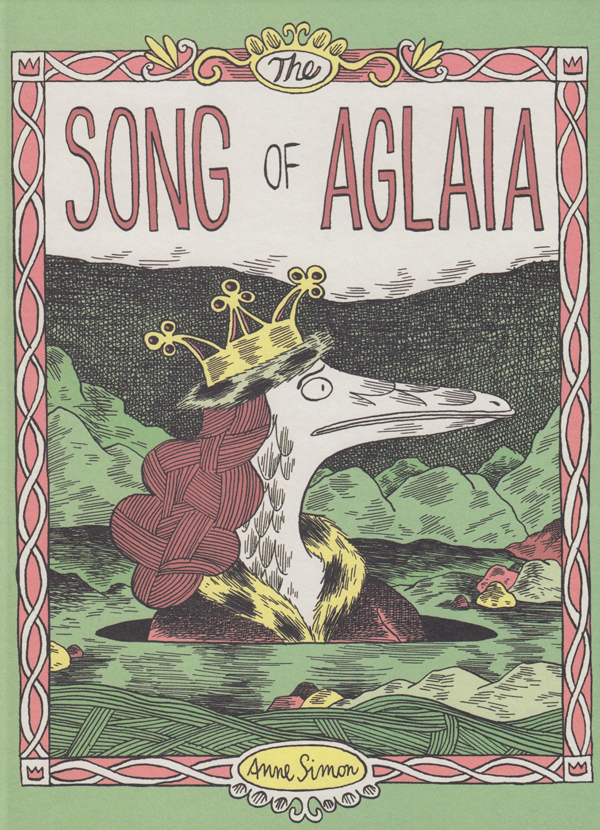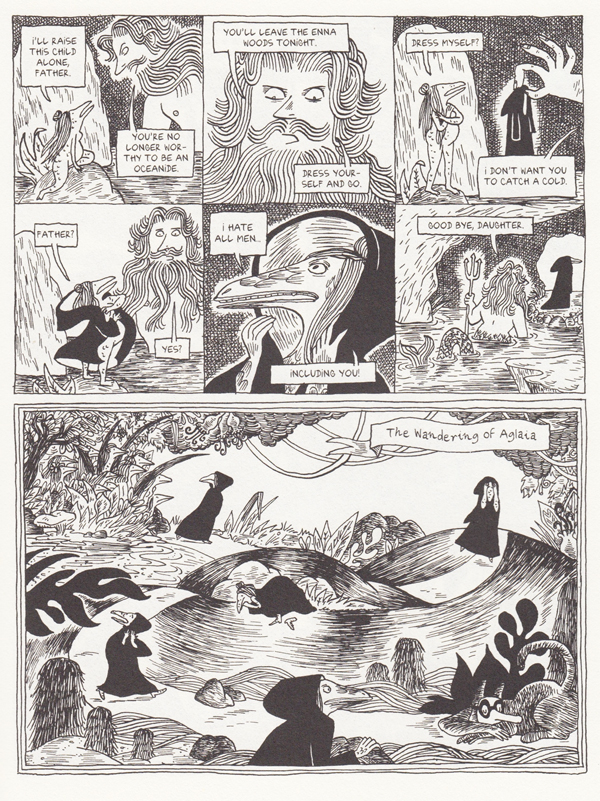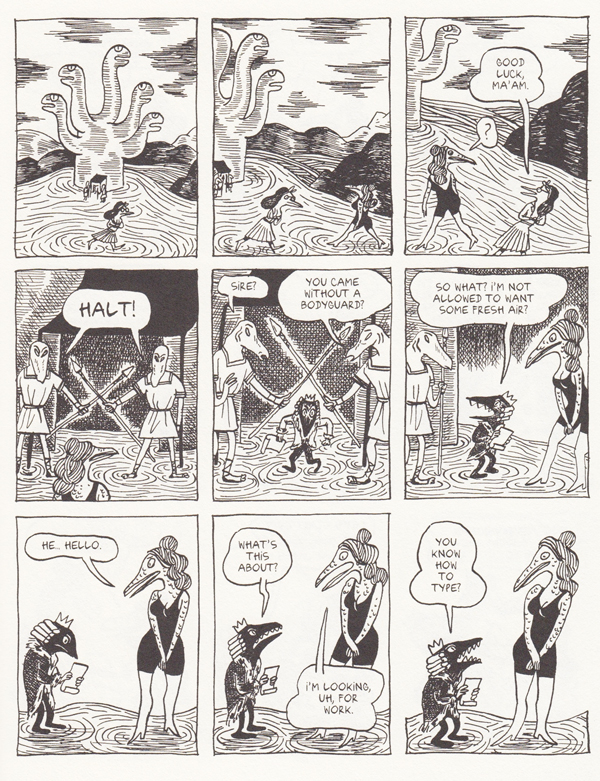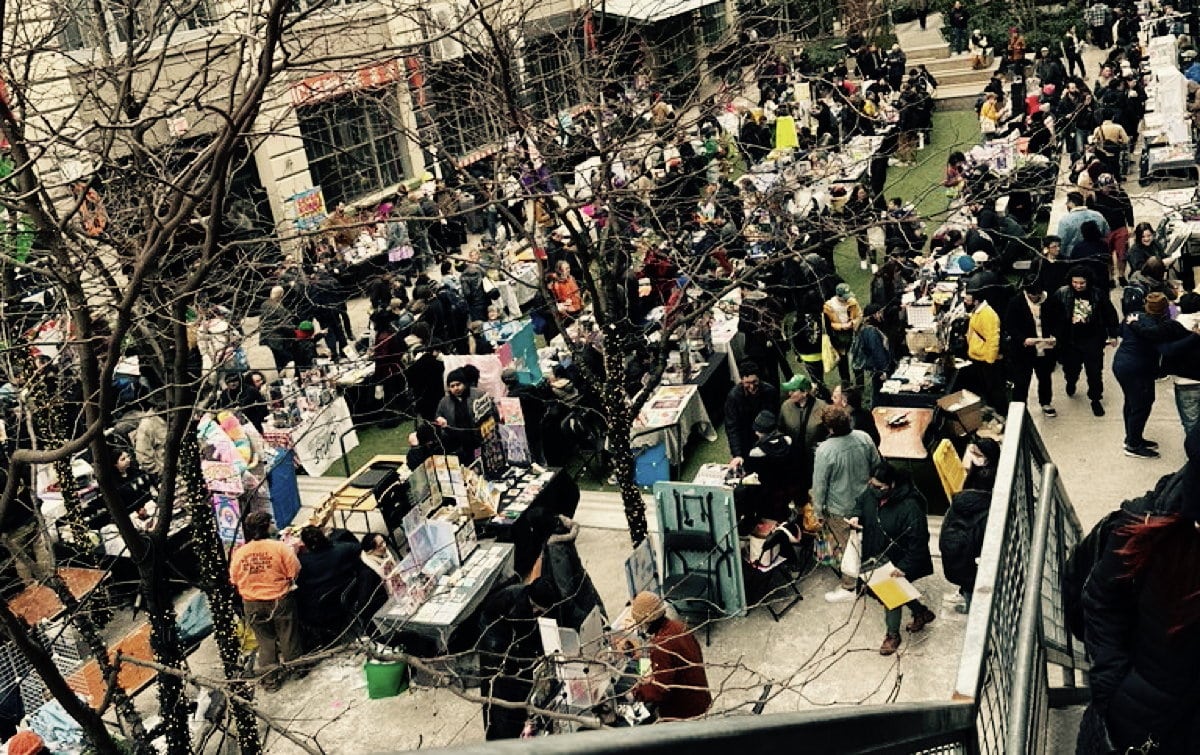Taking the traditional tropes of myths and legends and turning them on their heads, Song of Aglaia has French cartoonist Anne Simon trace the fairy tale life of a water nymph as she finds herself outside the world she was raised in, facing cruelty and working to overcome the darkness of the world.
When I say cruelty, I need to specify — male cruelty. Like so many young women in the old tales, Aglaia becomes the victim of a scoundrel, is harshly judged by her dictatorial father and faces several other hostile males in an attempt to overcome the general atmosphere of oppression and just make a happy life for herself. Pregnant and banished from her home, she falls in with a circus whose leader offers her a loveless haven from the tyrannical ruler of an oppressive phallocracy.
But Simon’s story is decidedly feminist and Aglaia acts in accordance with those ideas. She might have been initially naive, but she’s no push-over, exhibiting a boldness when threatened and an iron will when she has a goal. This both sets Aglaia apart from too many other women in myths and legends who crumble under their victimization but also aligns her with the tropes of the revenge fantasy, where the victim can become the oppressor.
As Aglaia makes her way in this fantasy world, it is always with the understanding that she has to fight harder, being a female. It’s always presented with the truth that obstruction and subjugation have been designed as a regular part of life for women in this world. And so a struggle is created for women, who when they are able to overcome the oppression, decides to make up for all that has been denied them.
At least that’s what happens with Aglaia.
It’s the basic structure of oppression in history. The dominant group treats marginalized group horribly for an indefinite period of time. Assuming marginalized group isn’t just wiped out, rumblings begin within it and it begins to rebel. The more the jackboot pushes their face into the ground, the harsher the struggle to remove the boot comes. Militancy is a natural reaction to crushing oppression. Then, dominant group criticizes the marginalized group for its hostility, working to hide the circumstances enacted by the dominant group upon the marginalized group that created the very hostility that it now claims to be a victim of. And on and on. It happens again and again. It’s still happening now.
One interesting aspect of Aglaia’s journey amidst these circumstances is her eventual advisor, Simone, who brings historical feminist concepts to their conversations and acts to formalize what for Aglaia is partly a natural reaction to the events of her life, to how she has been treated. Simone is a fascinating character that is behind a certain level of palace intrigue — more implied than ever shown — but always in service of complete equality for women and always in the context of the misogynistic ruler who previously dominated this fantasy world. She’s harsh, but you can’t blame her.
In the end, oppression becomes a more complicated situation, and when taken beyond terms of one type of person oppressing another type of person in a wider historical context, it becomes pretty personal. Oppression, as a counterpoint, also appears to be the result of personal decisions, of reflections of your own being, mixed in with the larger events out of your control. The black and white tropes of myths and legends are transformed into a decidedly gray arena that Aglaia inhabits. Simone’s ideas are both completely right and entirely inapplicable to the circumstances of Aglaia’s own life, a mix of things she has done right and wrong in reaction to a world that has done right and done wrong in regard to her. Cruelty, it becomes apparent, begets cruelty … unless you are very careful and thoughtful.
It’s a complicated conclusion, but Simon’s Tove Jansson-like presentation makes it work without indicting the sincerity of people working for justice. In a world that has embraced quick judgments based around political polemics, Aglaia shows that reality is what it is, despite how you might insist on judging by your own terms.











Love some of those pictures, particularly the big panel.
Comments are closed.